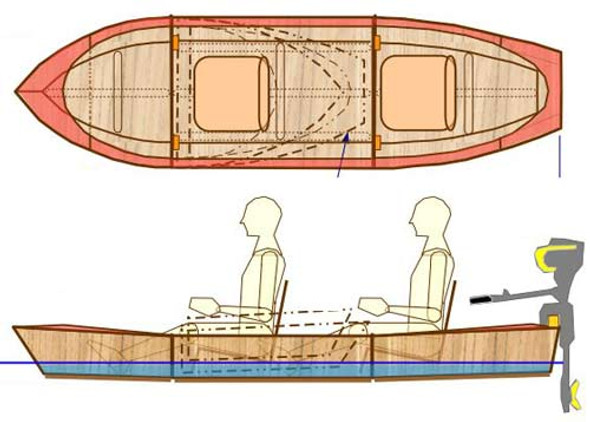Description
A seaworthy gunning skiff
13'6" x 4' {4.1m x 1.22m}
65 sq ft of sail area, utilizing a standing lug sail
Maximum recommended capacity is 450lbs/205kg
For Light Melonseed printed plans, click HERE
"A very seaworthy gunning skiff once popular in New Jersey" - that's how Howard Chapelle describes the classic Melonseed. Their waterfowl hunting days are over, but Melonseeds have seen a resurgence since then, as sailing dinghies with impeccable manners. They are fast, fun, easy to sail and user friendly. However, commercial versions of the Melonseed are very expensive to purchase, and the various plans available are expensive, time consuming and complex to build.

I am very interested in superior sailing dinghies, but not so much in spending a lot of time and money building one. I hopefully decided the convert a Melonseed to skin-on-frame construction - and it has turned into a wonderfully successful venture.
My SOF Light Melonseed weighs half or less than other designs, and takes only a few hundred dollars and a few weeks to build. She is extremely simple to rig and sail, performs great in light airs or heavy, looks good, is easily carried or car-topped, and has provided me with loads of low key sailing fun. I raced Lasers for years, but nowadays I like sailing this Melonseed a lot better . . . you get the same joy in a much easier to handle package.
Her hull weighs in at 80lbs {36kg} or so - enough to provide good stability, but light enough (barely) to get up onto the roof rack by one's self.

The Light Melonseed's cockpit floats high above the water in a capsize, and the wooden spars keep her from turning turtle - she's easily self rescued.
She is rigged with a standing lug sail of 65sq ft, but I've also drawn up a more traditional spritsail rig for her. Both are discussed in the building guide.
The plans detail construction for use with both a pivoting centerboard, or a simpler daggerboard.
Maximum recommended capacity is 450lbs {205kg}, or two adults and gear.
She is designed to incorporate floatation both fore and aft, and under the seats.

Needed: One sheet of 12mm and 1/2 a sheet of 6mm marine plywood, several 14' boards of Cypress or Douglas Fir, a 6' long ash or oak board, and one 10' long 2x4 for the strongback. As well, you'll need a few clear 12' boards for the spars - spruce or fir recommended. Wood types can often be substituted to fit local availability.
Also needed is the fabric for the skin, epoxy, screws, foam for floatation, paint, rigging and hardware, plus the sail (which can be built at home or purchased commercially).

The extensive building guide details everything you need to know to build the boat, including material quantities and sources. All measurements are in both imperial and metric. Full sized patterns are included with the plans, and no lofting is necessary.

Estimated time needed - about 30hrs to complete the hull, plus perhaps that much to finish her up, including the sailing rig.
This is a fairly complex project, with lots of little details, so not as quick as many of my boats. She's still suitable for a beginning builder, though, and far easier, faster and less expensive to build than any wooden version of a Melonseed.










